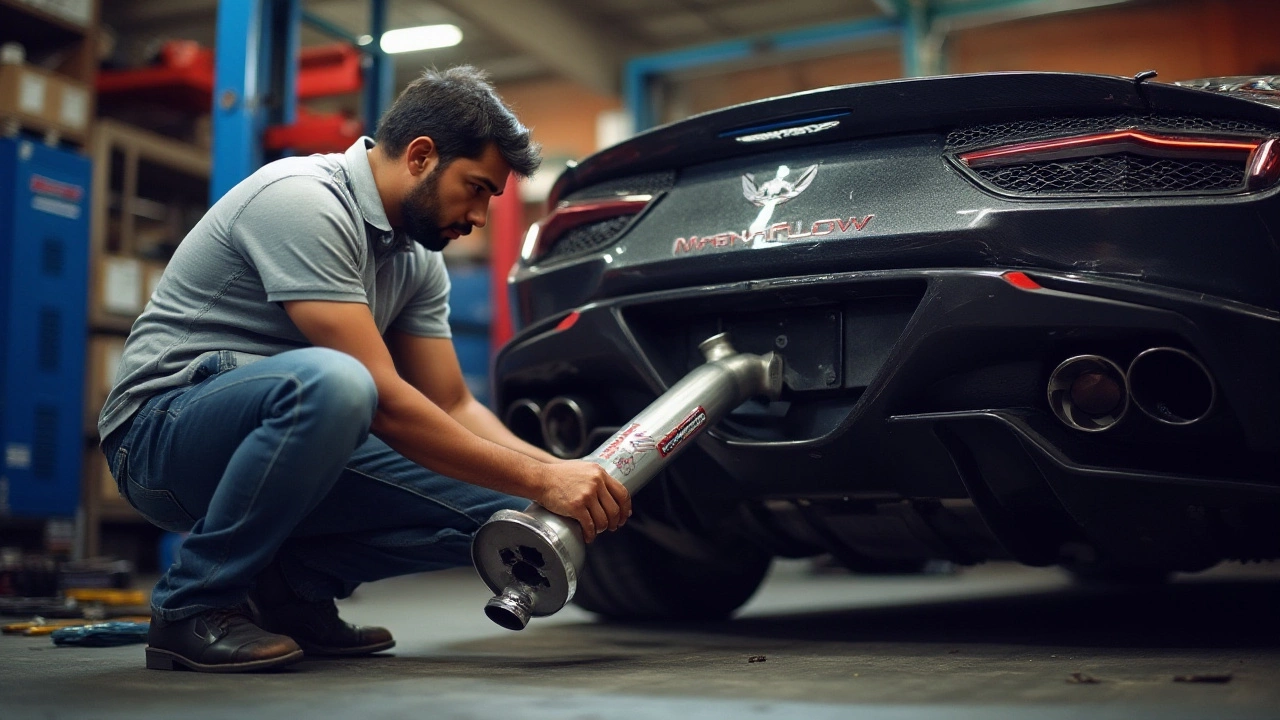 Jan, 17 2025
Jan, 17 2025
There's something exhilarating about the roar of an engine, a sound that echoes the promise of power and performance. For many car enthusiasts, enhancing this experience is a never-ending quest, and one component that frequently draws attention is the muffler. Specifically, MagnaFlow mufflers have gained popularity for their claims of increasing horsepower while offering a deep, resonant sound that aficionados love.
But what is the truth behind these claims? Does swapping out your stock muffler for a MagnaFlow truly open the door to more power, or is the reality more nuanced? In this article, we embark on a journey to uncover the science and stories behind MagnaFlow mufflers, exploring whether these performance parts live up to the hype. Whether you're a seasoned gearhead or a curious newbie, you'll find insights and practical advice to help you make the best decision for your vehicle's exhaust system.
- Understanding Mufflers and Horsepower
- The Technology Behind MagnaFlow
- Benefits and Considerations
- Installation Tips and Common Questions
Understanding Mufflers and Horsepower
The quest to unleash a car's true potential often leads to a deep dive into its components, and one of the usual suspects in this exploration is the MagnaFlow muffler. But before we dig deeper, let's unravel the basics of what a muffler does and how it orchestrates the symphony of power, known as horsepower. The muffler, located at the tail end of the exhaust system, primarily serves to mitigate the noise produced by the engine's exhaust gases. It uses clever design elements with sound-dampening materials and underwater labyrinths of passageways to perform this function.
While the purpose of a muffler is sound reduction, its structure can influence the back pressure of the exhaust system. Back pressure is the resistance against the flow of exhaust gases exiting the engine, and this can directly impact engine efficiency and horsepower. A high-performing car demands an optimized balance between minimal noise interference and effective gas expulsion. The unique design of the MagnaFlow muffler reduces such back pressure, allowing more freedom for the exhaust flow. With a more liberated escape route, the engine breathes easier, potentially tapping into more power.
In a robust study by the Society of Automotive Engineers (SAE), it was demonstrated how performance mufflers could yield significant gains in horsepower when used in conjunction with other tuning elements. These aftermarket mufflers are engineered with precision to retain lesser gases within the system.
"Efficient exhaust flow is crucial in maximizing horsepower," said John McKenny, an automotive engineer at SAE. "A well-designed exhaust system has a symbiotic relationship with the engine performance."The right muffler doesn't just enhance the auditory experience; it transforms it into a tactile one, adding a layer of kinetic thrill that can often be felt just as much as heard.
So, how exactly does this increase horsepower? Consider the engine as an air pump. The more efficiently it can intake air, combust it, and expel exhaust, the more power it can generate. The exhaust system plays an unsung role in this sequence, and a muffler's internal architecture can underpin this whole operation. By allowing exhaust gases to exit more swiftly and reducing unnecessary resistance, the MagnaFlow muffler can improve volumetric efficiency. While swapping a stock muffler with a performance muffler alone won't double your engine's output, it can help you realize gains of 2-5% in horsepower depending on the vehicle and engine type.
Thus, a MagnaFlow muffler becomes more than just an accessory; it's a conduit for expression and performance. When considering upgrades, it's essential to acknowledge that these changes, while relatively modest individually, create a cumulative effect. For those passionate about wringing out every last ounce of power from their machines, understanding the interplay between a muffler and horsepower is key. So, whether it's the deep throaty rumble reverberating through city streets or the subtle gain in torque you feel when you accelerate, knowing your muffler isn’t just silencing sounds—it’s singing the song of your engine's soul.

The Technology Behind MagnaFlow
When it comes to upgrading your vehicle's exhaust system, understanding the engineering behind the components is crucial. MagnaFlow mufflers are acclaimed for their precision design and cutting-edge technology. At the heart of their operation is a philosophy of unrestricted exhaust flow, which is pivotal in improving engine efficiency and increasing horsepower. The free-flow design minimizes back pressure —a significant factor that hinders engine performance. By allowing exhaust gases to escape more swiftly and efficiently, MagnaFlow maximizes the power output.
The core of a MagnaFlow muffler is often composed of perforated stainless steel, which is resistant to corrosion and degradation over time. This core typically works alongside a strategically layered acoustic material that helps minimize noise without entirely muting the robust sound car enthusiasts yearn for. This balance between performance and sound is a hallmark of MagnaFlow's appeal. A notable aspect of these mufflers is their aerodynamic property; they are designed using advanced computerized simulations to ensure optimum flow characteristics. The use of CFD (computational fluid dynamics) allows for precise modeling of gas flow, ensuring that every curve and chamber within the muffler promotes smooth passage of exhaust.
"The beauty of MagnaFlow's design lies in its ability to complement engine tuning," notes a renowned automotive engineer in an article for Performance Magazine. "It's not just about the decibels; it's about how effectively the system works with your car's engine dynamics to enhance power delivery."Additionally, manufacturing standards at MagnaFlow are meticulously maintained, with each product undergoing rigorous testing to meet both regulatory standards and consumer expectations. The mufflers typically feature a polished finish, which not only adds aesthetic value but also protects the product from the elements. It's not just engineering prowess that makes MagnaFlow a household name; it is also their dedication to maintaining high standards in customer satisfaction and environmental responsibility.
For those contemplating an upgrade, the environmental impact of an exhaust system is a growing concern. MagnaFlow is proactive in their approach to sustainability, ensuring that their products meet or exceed emissions standards where applicable. This commitment to environmentally friendly manufacturing practices is reflected in their development of catalytic converter solutions that work seamlessly with their muffler designs, striking a balance between power and conservation. Car enthusiasts can rest easy knowing that their choice supports eco-friendly practices. These elements combined make MagnaFlow a compelling choice for anyone looking to enhance their vehicle's performance. With their precise engineering and commitment to quality, you're not just buying a muffler; you're investing in a legacy of excellence.

Benefits and Considerations
When considering the transition to a MagnaFlow muffler, one of the foremost benefits that comes to mind is the potential boost in horsepower. These high-performance mufflers are engineered with precision to reduce backpressure and enhance exhaust flow, allowing the engine to breathe more easily. This characteristic means that your vehicle can potentially gain a few extra horses, giving it a more spirited performance edge. Drivers often notice a sharper response when they tap the gas, a subtle yet thrilling improvement that's more than just numbers on paper.
Sound and Aesthetics
Another captivating aspect of MagnaFlow mufflers is their signature sound. Unlike the stock counterparts that aim for silent operation, MagnaFlow embraces a deep, resonant voice that car enthusiasts adore. It's not overwhelming but breeds a sense of power that is unmistakable and engaging. While sound is subjective, many agree that the enhanced growl adds a pleasing aural experience. Plus, these mufflers boast sleek designs that often elevate the visual appeal of your vehicle's rear end, aligning with the performance upgrades under the hood.Considerations for Everyday Use
Before any upgrade, it is essential to weigh the pros against potential drawbacks. In the case of MagnaFlow mufflers, one aspect to consider is compatibility with your vehicle's make and model. Installing a performance muffler sometimes requires additional modifications to existing exhaust systems or mounts. It's crucial to check whether these changes might affect vehicle warranties or legal noise regulations in your area. Additionally, while the promise of increased horsepower sounds alluring, not every vehicle may experience substantial gains, especially if the engine's other components remain stock. A balanced approach to modification tends to yield the best results."Performance isn't just about the numbers; it's about how the car makes you feel when you're behind the wheel," shares Ray Magliozzi, famed car enthusiast and host of the once-popular Car Talk radio show.
Cost and Investment
The decision to invest in a MagnaFlow muffler also involves financial considerations. The cost can vary significantly depending on the specific model and any additional modifications necessary during installation. However, many find that the investment is worthwhile, particularly those who value the performance and acoustic improvements. Often considered a tangible expression of car culture, investing in a quality muffler is more than just an enhancement—it's a celebration of machinery, sound, and the thrill of the drive. For those who value these elements, the rewards of transitioning to MagnaFlow are experiences that extend beyond the mere technical specifications.
Installation Tips and Common Questions
When it comes to enhancing your car's performance with a MagnaFlow muffler, the installation process is an exciting step that demands attention to detail. Whether you're a DIY enthusiast or seeking professional help, understanding the installation nuances can make the difference between a seamless upgrade or hours spent grappling under the hood.
The first thing to consider is the compatibility of the MagnaFlow muffler with your vehicle's specific model and year. This ensures that the muffler fits properly and performs at its best. Take advantage of online resources and MagnaFlow's own catalog, which can guide you through selecting the right exhaust piece tailored to your car. It’s always wise to check your warranty paperwork, ensuring that modifications like these won’t void any agreements.
Gathering the Right Tools and Materials
Having the right tools at hand can save you considerable headaches during installation. Most installs will require basic hand tools like a socket set, wrenches, and perhaps a saw or cutting tool for removing the old system. Don’t forget about jack stands for safely lifting the vehicle. Gather your tools and check your materials beforehand to avoid multiple trips to the auto parts store. Safety is paramount, so ensure that your workspace is secure and that you have a reliable means of lifting your car. If you're not comfortable doing the work yourself, investing in a professional installation can be a smart choice. Many garages with experience in exhaust systems can fit your MagnaFlow muffler to precision, ensuring optimal performance.
Step-by-Step Installation Process
The installation process itself isn't overly complex, but it requires a mix of patience and precision. Begin by loosening the bolts and clamps of your existing exhaust, taking care to support it properly as you remove it. Often, there can be some rust or stubborn fittings, so a bit of penetrating oil might be handy.
Once the old muffler is out, take this opportunity to examine the new MagnaFlow muffler. Make sure all welded joints and components are in good condition before proceeding. Carefully align the new muffler with your vehicle’s exhaust pipes, attaching the clamps and gasket for a secure fit. It's crucial to ensure there are no air gaps or misalignments, as these can affect performance and sound. Consider using high-temperature gasket sealant on joints to avoid leaks.
FAQ Section
Installation can seem daunting, but practice and patience go a long way. As one automotive enthusiast said, 'The first exhaust I installed took me all afternoon, but the satisfaction at the end was well worth it.'
A common question among enthusiasts is whether the MagnaFlow muffler will significantly increase horsepower. While it's true that these mufflers are designed to enhance flow and reduce backpressure, it’s important to manage expectations. You might see a modest increase in horsepower and torque, particularly in conjunction with other modifications such as headers or a high-flow catalytic converter. Remember, modification isn’t solely about gaining more power but also about improving sound and efficiency.
Another query often brought up concerns legalities. Always ensure that any changes to your exhaust system comply with local noise ordinances and emissions regulations. Some states have strict laws about vehicle modifications, particularly related to sound pollution. You can reach out to MagnaFlow's customer service for clear guidance on product legality specific to your region, helping you make informed decisions without navigating through technical jargon or unclear online forums.
Ultimately, the joy of modifying a vehicle should blend with responsible choices, both in terms of adhering to regulations and in choosing enhancements that truly contribute to your car's performance. Whether your goal is to boost horsepower, embrace the gratifying exhaust note that a MagnaFlow muffler provides, or simply dip your toes into the world of automotive modification, ask questions, and seek advice from experienced peers. Experiencing the roar of a well-tuned engine is itself a journey, one that many enthusiasts find delightfully addictive.